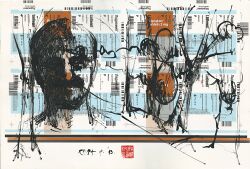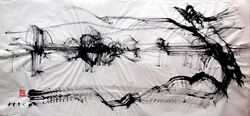Difference between revisions of "Alfred Freddy Krupa"
KatowicePL (talk | contribs) |
KatowicePL (talk | contribs) |
||
| Line 6: | Line 6: | ||
The original manuscript of the New Ink Art Manifesto is the property of the '''documenta archiv''', records and papers collection (Aktenarchiv) in Kassel (the access number docA-97)<ref>https://www.documenta-archiv.de/en/archiv/28/records-and-papers</ref>. | The original manuscript of the New Ink Art Manifesto is the property of the '''documenta archiv''', records and papers collection (Aktenarchiv) in Kassel (the access number docA-97)<ref>https://www.documenta-archiv.de/en/archiv/28/records-and-papers</ref>. | ||
| − | On 23rd April 2013, the Tokyo-based online magazine '''Beyond Calligraphy''' published Krupa's second programmatic text under the title '''"Sumi-e from the Perspective of a Traditional Academically-trained European Artist"''' where the artist further explains his own original views and again declares his artistic program (sometimes it is referred to as '' | + | On 23rd April 2013, the Tokyo-based online magazine '''Beyond Calligraphy''' published Krupa's second programmatic text under the title '''"Sumi-e from the Perspective of a Traditional Academically-trained European Artist"''' where the artist further explains his own original views and again declares his artistic program (sometimes it is referred to as ''the 2nd New Ink Art Manifesto'')<ref>https://beyond-calligraphy.com/2013/04/24/sumi-e_from_the_perspective_of_a_traditional_academically-trained_european_artist/</ref>. |
In 2014 Krupa created an artist's book '''"Modern Ink Painting, what is it? or the Original Art Work"''', in 2021 collected by the '''Museum of Modern Art in New York (MoMA)'''<ref>https://library.moma.org/permalink/01NYA_INST/90vked/alma991007278739707141</ref><ref>https://artmarketmag.com/museum-of-modern-art-moma-collected-3-artworks-of-the-pioneer-of-the-new-ink-art-movement-alfred-freddy-krupa/</ref> | In 2014 Krupa created an artist's book '''"Modern Ink Painting, what is it? or the Original Art Work"''', in 2021 collected by the '''Museum of Modern Art in New York (MoMA)'''<ref>https://library.moma.org/permalink/01NYA_INST/90vked/alma991007278739707141</ref><ref>https://artmarketmag.com/museum-of-modern-art-moma-collected-3-artworks-of-the-pioneer-of-the-new-ink-art-movement-alfred-freddy-krupa/</ref> | ||
Revision as of 21:12, 24 August 2022
Alfred Freddy Krupa (Krūppa) (14 June 1971, Karlovac, Yugoslavia) is a Croatian contemporary artist (painter, master draughtsman, book artist, art photographer and art teacher)[1][2].
Krupa, the author of the "New Ink Art Manifesto" (1996)[3], is considered one of the pioneers of the New Ink Art movement and as one of the leading representatives of the modern European ink painting[4][5]. The original manuscript of the New Ink Art Manifesto is the property of the documenta archiv, records and papers collection (Aktenarchiv) in Kassel (the access number docA-97)[6].
On 23rd April 2013, the Tokyo-based online magazine Beyond Calligraphy published Krupa's second programmatic text under the title "Sumi-e from the Perspective of a Traditional Academically-trained European Artist" where the artist further explains his own original views and again declares his artistic program (sometimes it is referred to as the 2nd New Ink Art Manifesto)[7].
In 2014 Krupa created an artist's book "Modern Ink Painting, what is it? or the Original Art Work", in 2021 collected by the Museum of Modern Art in New York (MoMA)[8][9]
New Ink Art
Artists associated with the New Ink Art movement: Lui Shou-Kwan, Chui Tze-Hung, Wong King-Seng, Yu-Ichi, Qiu Anxiong, Lin Fengmian, Kan Tai-Keung, Leung But-Yin, Zhu Yu, Gu Wenda Xu Beihong, Carrie Koo Mei, Alfred Freddy Krupa, Wang Tiande, Irene Chou Lu Yun, Yeung Yick-Chung, Liu Dan, Yang Yiechang, Irène Wydler, Wang Chuan, Daniel Garbade and others[10].
Publications
- "New Ink Art Manifesto", 1996
- "Sumi-e from the Perspective of a Traditional Academically-trained European Artist", 2013
- "The Theory Of Strings/Theory Of Everything In The Modern (Ink) Painting Practice?", 2017
- Drawing with Ink (an article written in 1994), published in the book Texts (1994 - 2017), Alfred Freddy Krupa, ISBN: 9781364027797, 2018 [1]
- Mislite! Think!, Alfred Freddy Krupa, ISBN 978-953-6540-86-0, 2020 [2]
References
- ↑ https://www.degruyter.com/view/AKL/_a4a5c19a-3521-4b90-aa47-17bcf149cab8?rskey=ovjb85&result=2&dbq_0=krupa+alfred&dbf_0=akl-fulltext&dbt_0=fulltext&o_0=AND
- ↑ https://catalog.princeton.edu/catalog/9964370
- ↑ https://www.districtartisan.com/new-ink-art-manifesto-by-krupa-1996/
- ↑ https://www.artacacia.com/pages/alfred-freddy-krupa
- ↑ https://www.widewalls.ch/alfred-freddy-krupa-exhibition-vjekoslav-karas-gallery/
- ↑ https://www.documenta-archiv.de/en/archiv/28/records-and-papers
- ↑ https://beyond-calligraphy.com/2013/04/24/sumi-e_from_the_perspective_of_a_traditional_academically-trained_european_artist/
- ↑ https://library.moma.org/permalink/01NYA_INST/90vked/alma991007278739707141
- ↑ https://artmarketmag.com/museum-of-modern-art-moma-collected-3-artworks-of-the-pioneer-of-the-new-ink-art-movement-alfred-freddy-krupa/
- ↑ https://artfacts.net/movement/modern%20ink%20painting

